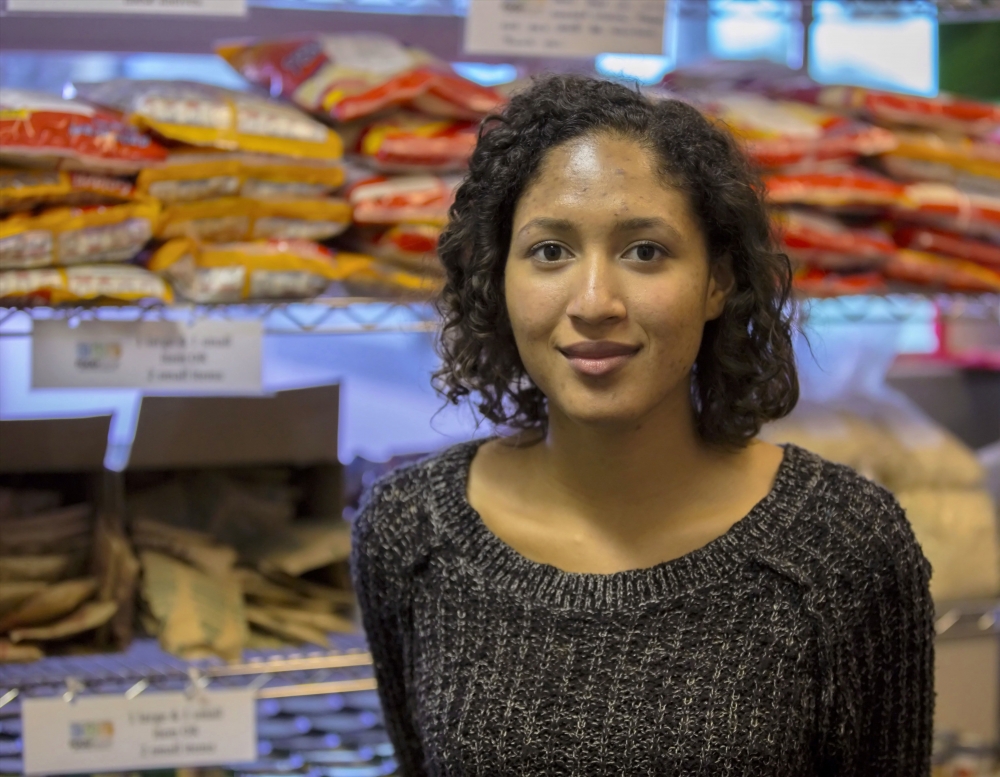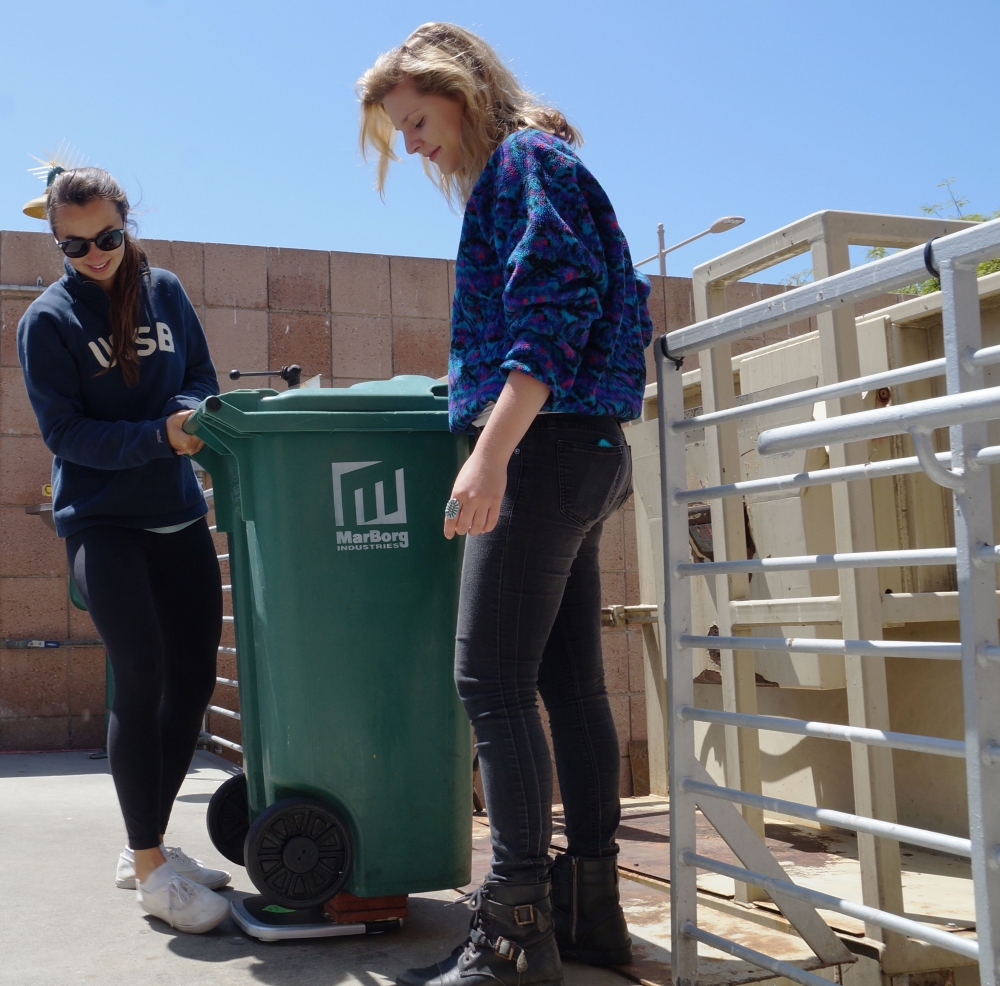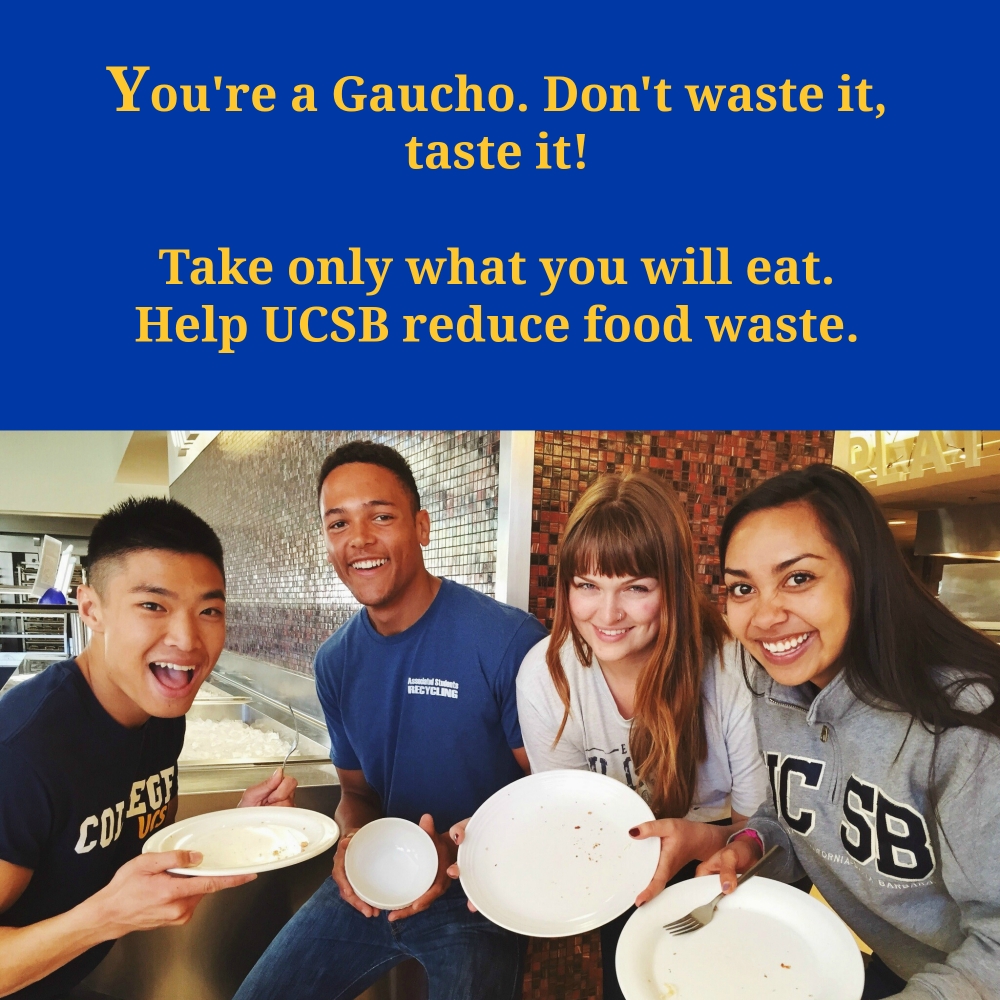An Appetite for Food Reform
In some circles, Sunday brunch is almost an institution. Nothing like a lazy morning meal — maybe at an outdoor table to soak in some vitamin D — to max out on relaxation before a new week begins. That’s the ritual.
A far less common practice: Waiting outside a restaurant to weigh all the food that gets tossed out after the diners are done. But that’s exactly how UC Santa Barbara seniors Emilie Wood and Kate Parkinson spent their weekend brunch periods at the campus dining commons, every Saturday and Sunday alike, throughout spring quarter.
The pair has in fact been working much of the academic year to assess and reduce food waste on campus in their shared role as UCSB’s inaugural UC Global Food Initiative (GFI) Fellows. A third GFI fellow, Rachel Rouse, also a UCSB graduating senior, is studying food insecurity and access among the student populations.
“Of all the food that is wasted, 30 percent occurs at the consumer level,” said Wood, of Danville, who will graduate with a degree in environmental studies. “When you’re throwing away a carrot, you’re not just throwing away that carrot, but also the water and the nutrients used to grow it, the money that went into it, the time, the labor, the gas used to transport it. It’s important to be conscious of that because it’s something that you, individually, can have an impact on — one person’s actions can make change. And that’s what we’re trying to get at with our project.”
Theorizing that such individual changes are crucial for making major inroads to reduce food waste, Wood and Parkinson turned to behavioral science for an answer, devising two messages for prominent display during weekend brunch periods at the campus’s residential dining facilities.
One statement that played to diners’ sense of community: “You’re a Gaucho. Don’t waste it, taste it! Take only what you will eat. Help UCSB reduce food waste.” The other appealed to eaters’ sense of ethics and desire to do the right thing: “Food waste is bad for the environment. Don’t waste it, taste it! Take only what you will eat. Help UCSB reduce food waste.”
Using the environmental appeal as a control, that message was displayed in one facility for several weeks before swapping it out for the social validation message. A second facility saw only the social appeal for the duration of the survey period. Wood and Parkinson weighed weekend food waste at both dining halls throughout and are now in the midst of analyzing their data and producing a formal report of their findings.
Beyond the documentation, Wood and Parkinson asserted, the ultimate hope is that the more successful message can be permanently erected in UCSB dining facilities — and that their work can inform similar efforts across the UC system.
"Being a UC Global Food Initiative Fellow has been such an eye-opening experience for me,” Wood said. “It has also shown me the commitment that we as a university have to being as sustainable as possible, and the many opportunities for undergraduate research that are available on this campus. I am so happy to be involved in such a great initiative, and I look forward to seeing the work of my peers and of future food fellows, as it is important not only to the UC system but to all people as we look for solutions within the food system.”
Added Parkinson: “This whole process has made me a lot more conscious about food waste, invigorated my interest in food more and influenced my personal habits to be more conscious of all environmental issues,” said Parkinson, a biology major, who plans to study with a tropical biology and conservation program in Costa Rica this fall. “Since living in Santa Barbara I’ve gotten more intrigued by the local and organic food movements and become really interested in how food affects the environment. The opportunity to do a senior research project related to food and my blossoming interest in these issues has been great — it all just came together through this fellowship.”
A GFI fellowship was also a natural progression for Rouse, of Sacramento, who has worked the last three years at UCSB’s Associated Students Food Bank. It was her personal background, marked by periods of poverty and hunger, she said, that first inspired her involvement with the campus pantry; the combination of those things is what compelled her to create her project examining food insecurity and the economic or social conditions that limit access to adequate and appropriate foods.
“Food insecurity is an issue very close to my heart,” said Rouse, who will earn her degree in biopsychology and aspires to become a nurse practitioner. “It’s my family’s story living in poverty, it’s my story coming into college without quality health insurance and it’s the story of my peers as they struggle every day to succeed in a university that costs so much to attend. We do not exist without food. Struggling to access adequate food is a huge distractor from a job, an internship, volunteering and your GPA.”
Seeking to evaluate the severity and prevalence of student hunger on all UC campuses, Rouse has developed a survey to measure that information. With the Food Bank client community as her participant pool, Rouse is asking about everything from the quality and cultural appropriateness of the food, to wait times, to the capacity of the pantry. Her questions also explore the variety of food options available on campus more broadly, as well as demographic inquiries “to see if we can narrow in on populations of students that are struggling the most.”
“Hopefully this project will lead to a best practices guide for current and future food pantries on UC campuses,” Rouse said. “The college environment comes with a unique set of challenges that many of us were not prepared for coming in. I think students can change a lot on campus. It’s just going to take a bit more work for students to band together and recognize that many of us have the same struggles with regards to food.
An extension of the broader UC Global Food Initiative that launched in July 2014, the GFI fellowships were introduced that fall as a way to engage students in the ongoing systemwide effort to address food security, health and sustainability. This spring, UC President Janet Napolitano announced a two-year extension of the fellowship program, as well as additional funding — the amount for each fellowship will increase from $2,500 to $4,000 to support food-focused student research, projects or internships.
“The UC Global Food Initiative Fellows Program has given us the opportunity to engage students in developing new solutions and to integrate a student perspective of the challenge of food insecurity and sustainability initiatives,” said Katie Maynard, campus sustainability coordinator based in UCSB’s Department of Geography and a leader in UCSB’s GFI-related efforts. “It has been a joy to work with these fellows over the past year. They are creative and passionate in their pursuit of sustainable solutions for our food system.”







